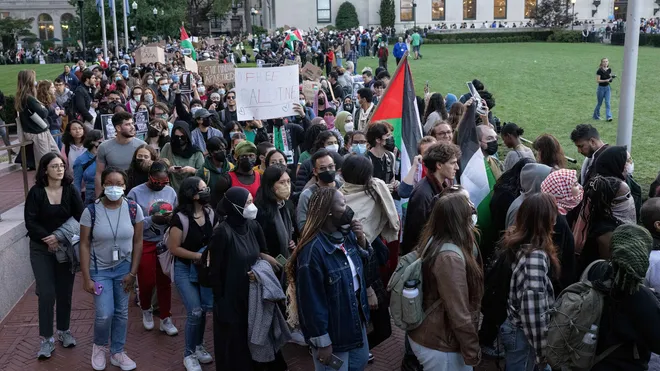
Protests on US college campuses against the Gaza conflict are on the rise
Protests against the Gaza conflict have exploded at US universities, resulting in hostilities and arrests among student activism.
Columbia and Yale have been the epicenter of anti-Gaza protests, which have now extended to other institutions as authorities try to contain the growing demonstration movement.
Police proceeded to disperse a protest at New York University on Monday night and made several arrests in the process.
While Columbia canceled in-person sessions earlier in the day, dozens of students were arrested at Yale.
Similar “encampments” have appeared at MIT, Berkeley, and other universities around the nation.
Since the attack on Israel by Hamas on October 7, US universities have been roiled by protests and intense discussions over the Israel-Gaza conflict and free speech.
According to Israeli counts, some 1,200 Israelis and foreigners—mostly civilians—were killed, while 253 others were taken as hostages back to Gaza.
In response, Israel declared war on Gaza, the hardest war it had ever waged, with the intention of eliminating Hamas and liberating the prisoners. According to the health ministry of Hamas, over 34,000 Palestinians in Gaza have died in the battle, the majority of them being women and children.
Students in the US claim that occurrences of Islamophobia and antisemitism have increased.
President Joe Biden stated he opposed “the antisemitic protests” and “those who don’t understand what’s going on with the Palestinians” in response to a question regarding the Monday university demonstrations.
Following the arrest of numerous protestors by New York City police last week at Columbia University’s campus in the city, the movement known as “campus protest” gained international attention.
Columbia President Minouche Shafik stated in a statement released on Monday that all classes will be conducted remotely, citing instances of “intimidating and harassing behavior”.
Dr. Shafik claimed that people “who are not affiliated with Columbia who have come to campus to pursue their own agendas” had “exploited and amplified” the tensions on campus.
Opponents pitched tents across from the Stern School of Business at New York University.
The demonstrators at NYU are requesting that the university reveal and divest its “finances and endowments from weapons manufacturers and companies with an interest in the Israeli occupation,” as has been the case at some other campuses.
On Monday night, when night fell, police started making arrests of demonstrators.
At Yale University in New Haven, Connecticut, where protests had grown to several hundred participants over the weekend, about fifty demonstrators were taken into custody just hours earlier.
Those detained, according to the university, had disregarded “multiple requests” to leave.
At the Massachusetts Institute of Technology, the University of Michigan, Tufts, the University of California at Berkeley, Emerson College, and the University of Michigan, protest camps have also been set up.
Yet charges of antisemitism have clouded the university demonstrations.
For instance, footage that surfaced online seemed to show demonstrators in the Columbia area endorsing the Hamas assault on Israel.
During her Monday tour of Columbia, Democratic Congresswoman Kathy Manning reported seeing demonstrators who were demanding the destruction of Israel.
Furthermore, the Hasidic organization Chabad at Columbia University reported that hurtful remarks and screams had been directed towards Jewish students.
Additionally, 300 Jewish Columbia students are said to have received a warning from an on-campus rabbi to stay away from school until things “dramatically improve.”
Protesters claim their criticism is directed on the Israeli government and its allies, and they have denied any antisemitism.
Columbia Students for Justice in Palestine criticized “inflammatory individuals who do not represent us” and declared in a statement on Sunday that they “firmly reject any form of hate or bigotry.”
A working committee has been established to “try to bring this crisis to a resolution,” according to Dr. Shafik’s statement. We are pleading with the institution to address the matter, as well as with Dr. Shafik, who traveled to Capitol Hill last week to speak before a congressional committee on the university’s antisemitism initiatives.
Representative Elise Stefanik, a Republican from New York, joined a group of federal lawmakers on Monday in signing a petition demanding her resignation for what she described as a “failure to put a halt to the mob of students and agitators pushing for acts of terrorism against Jewish students.”
Democratic Representatives Kathy Manning, Jared Moskowitz, Josh Gottheimer, and Dan Goldman were also drawn to the demonstrations in New York.
Congressman Gottheimer threatened to make Columbia “pay the price” if the university did not make Jewish students feel safe and welcome.
The chair of the House Education Committee, Republican Virginia Foxx of North Carolina, stated in an online letter that “Columbia’s continued failure to restore order and safety” constituted a violation of the terms upon which federal assistance was contingent and that this violation needed to be “immediately rectified.”
Robert Kraft, a well-known Columbia graduate and the owner of the NFL’s New England Patriots, also issued a warning in response to the protests, saying he would stop funding the university “until corrective action” was made.
However, several university faculty members have criticized Columbia for how it handled the demonstration and for contacting the police.
The Knight First Amendment Institute in Columbia issued a statement on Monday night requesting a “urgent course correction.”
In support of the claim that outside authorities should only get involved in cases where there is a “clear and present danger to persons, property, or the substantial functioning of any division of the university,” the article cited university regulations.
“Even though the protests and encampment were unapproved, it is not clear to us how they posed such a danger,” the statement read.
Wider protests against the circumstances in Gaza have also taken place in the US.
Pro-Palestinian demonstrators have recently shut down important highways across the nation, limiting travel to airports such as Seattle-Tacoma International and Chicago’s O’Hare International, as well as the Brooklyn Bridge in New York and San Francisco’s Golden Gate Bridge.
All Categories
Recent Posts
Tags
+13162306000
zoneyetu@yahoo.com



